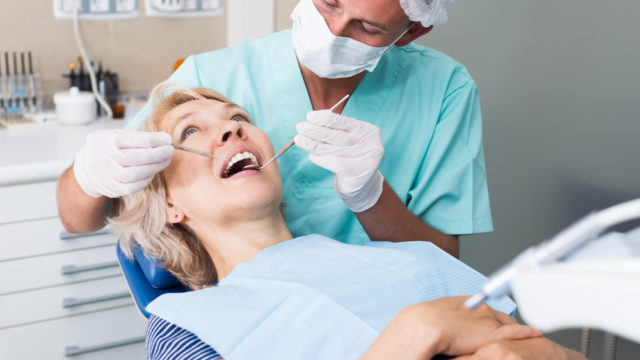
Article at a Glance
- April is Oral Cancer Awareness Month.
- Cancer of the mouth and upper throat, also known as oral and pharyngeal cancer, is deadly and can leave survivors with facial disfigurement, difficulties eating, and problems with speech.
- Oral cancer is treated with surgery, chemotherapy, radiation therapy, targeted drug therapy, immunotherapy, or a combination of more than one treatment option.
- Lifestyle choices that you can make to lower your chances including stopping tobacco use, limiting alcohol intake, and avoiding extended exposure to the sun.
- Perform monthly self-exams and be sure to keep regular appointments with your dentist for proper screenings.
April is Oral Cancer Awareness Month and shines a spotlight on the effects of cancer of the mouth and upper throat. In the United States, approximately 53,000 people will be diagnosed with oral cancer this year and a quarter of all cases have no risk factors. The best chance to beat oral cancer is with early detection, so take the time to educate yourself and spread the word!
What Are the Symptoms of Oral Cancer?
Like other types of cancer, oral cancer involves the growth of cells that invade and damage surrounding tissue. Cancer of the mouth may present in different ways, but the most common signs include:
- Unexplained swelling, lumps, bumps, or rough spots on the soft tissue of the mouth including the lips
- White, red, or white and red patches in the mouth
- Unexplained bleeding in the mouth
- Numbness, pain, or tenderness in the mouth, on the face, or along the neck and throat
- Sores on the face, neck, or mouth that bleed easily and don’t heal within a few weeks
- Chronic sore throat or a persistent feeling of something caught in the back of the throat
- Problems with chewing, swallowing, or speaking
- Loss of voice, change in voice, or chronic hoarseness
- Persistent ear pain
- Unintentional, dramatic weight loss
If you notice any of these symptoms, contact your dentist immediately. Your dentist will perform an oral cancer screening to look for abnormalities and any other signs. A biopsy may be done to determine the composition of any suspicious areas. You will have to be diagnosed by a doctor or dentist before a treatment plan can be established.
How is Oral Cancer Treated?
Oral cancer treatment can vary depending on the stage and location of the cancer as well as the patient’s health. More than one type of treatment may be necessary to ensure the best possible outcome.
- Surgical intervention involves removing the tumor or the entire area around the tumor if it spread into the neck and lymph nodes. Surgery may also be recommended to reconstruct the mouth with grafts and implants to help patients regain function.
- Radiation therapy involves the use of high-energy beams to destroy cancer cells. It can be used alone in early stages or in conjunction with surgery in later stages.
- Chemotherapy uses chemicals to destroy the cancer cells and may be used with other types of treatment, especially radiation, to increase a patient’s prognosis.
- Targeted drug therapies alter parts of the cancer cells to prevent them from growing. This method can be combined with chemotherapy or radiation therapy.
- Immunotherapy is generally reserved for advanced cases that don’t respond to other treatments. It involves using your own immune system to fight the cancer.
How to Prevent Oral Cancer
Some risk factors for oral cancer can’t be changed. For example, men are twice as likely to develop oral cancer than women and the likelihood rises after the age of 55. However, there are factors that you can control to lower your chances. Lifestyle choices can increase the likelihood of developing cancer of the mouth. Quitting tobacco use, limiting your alcohol intake, avoiding long periods in the sun, and eating a lot of fruits and vegetables are key steps to lower your chances of developing oral cancer.
Performing self-exams on a regular basis is an excellent way to catch mouth cancer early. Self-exams only take a few minutes and can be done as part of your morning or nightly routine.
- Remove any dentures or appliance.
- Feel around the inside of your lips and gums.
- Check the roof of your mouth by tilting your head back slightly.
- Check the insides of your cheeks and back gums by pulling your cheek outward so you have a good view.
- Stick your tongue out and examine all surfaces.
- Feel along your neck and lower jaw for any lumps or enlarged lymph nodes.
If you notice any of physical signs of oral cancer or are experiencing any of the other symptoms during your monthly self-exam, contact your dentist immediately for evaluation. Keep regular appointments with your dentist to ensure proper screenings since your dentist can see things you may have missed.
If you’re concerned you may have oral cancer or you know it’s time for a check-up and teeth cleaning, schedule an appointment with the Jefferson Dental Care clinic nearest you today.
Additional Sources:
https://www.aaoms.org/images/uploads/pdfs/oralcancerselfexam.pdf
https://www.aaoms.org/docs/media/oral_cancer/2017_oral_cancer_fact_sheet.pdf
https://preventcancer.org/education/preventable-cancers/oral-cancer/
https://oralcancerfoundation.org/events/oral-head-neck-cancer-awareness-month/
https://oralcancerfoundation.org/april-oral-cancer-awareness-month/




